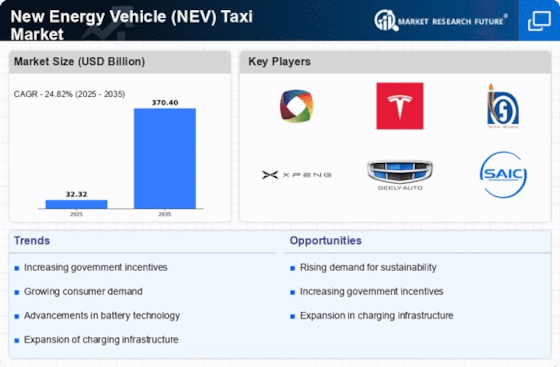Top Industry Leaders in the New Energy Vehicle Taxi Market
The New Energy Vehicle (NEV) taxi market is accelerating with the force of a high-performance engine, driven by sustainability objectives, governmental incentives, and shifts in consumer preferences. In this dynamic arena, competition is fierce, featuring traditional automakers, tech behemoths, and nimble startups, all striving for supremacy.
Key Player Strategies:
Traditional Automakers: Esteemed players such as Toyota, Volkswagen, and General Motors are harnessing their established manufacturing capabilities and brand recognition to introduce dedicated NEV taxi lines. Crucial tactics include forming partnerships with fleet operators and governments, coupled with aggressive expansion into emerging markets like China and India.
Tech Giants: Companies like Tesla and Baidu are entering the market with disruptive technologies, placing a strong emphasis on autonomous driving and ride-hailing platforms. Their commitment to data-driven solutions and seamless user experiences seeks to reshape the entire taxi ecosystem.
Start-ups: Agile and flexible, start-ups like Nio and Rivian are addressing niche gaps with innovative vehicle designs and adaptable charging solutions. Their direct-to-consumer approach and focus on personalization are resonating with tech-savvy urban customers.
Factors for Market Share Analysis:
Vehicle Range and Performance: Electric vehicles (EVs) with extended range and faster charging times confer operational advantages for taxi fleets, influencing profitability and driver satisfaction.
Cost of Ownership: Despite higher upfront costs, NEVs boast lower maintenance and fuel expenses in the long run. Competitive financing options and government subsidies can further tip the scales in their favor.
Charging Infrastructure: The availability and reliability of charging stations are pivotal for taxi operations. Establishing partnerships with energy providers and investing in proprietary charging networks serve as key differentiators.
Technology and Innovation: Companies offering advanced features such as autonomous driving, in-vehicle entertainment, and seamless ride-hailing integration gain a competitive edge.
New and Emerging Trends:
Vehicle-to-Grid (V2G) Technology: NEVs can potentially serve as mobile energy storage units, selling excess power back to the grid during peak demand and creating revenue streams for taxi operators.
Subscription-based Models: Flexible ownership options like leasing and pay-per-use models are gaining traction, making NEVs accessible to a broader customer base.
Shared Mobility and Ride-hailing: Integration with ride-hailing platforms and car-sharing services will optimize vehicle utilization and reduce individual car ownership, influencing the overall taxi market landscape.
Overall Competitive Scenario:
Success hinges on adapting to evolving consumer preferences, embracing new technologies, and forging strategic partnerships. Collaboration between automakers, tech companies, and governments will be vital for scaling up charging infrastructure and addressing regulatory hurdles. Ultimately, the winners will be those delivering the most efficient, sustainable, and user-friendly NEV taxi experience.
Industry Developments and Latest Updates:
Tesla Inc.: On December 28, 2023, Tesla announced plans to expand its NYC taxi fleet with 100 new Model 3 sedans, bringing the total to 200, following a successful pilot program launched in August.
BYD Company: On December 22, 2023, BYD signed a deal with Shenzhen DiDi to provide 10,000 electric taxis over the next three years, solidifying its position as the leading provider of NEVs in China.
Toyota Motor Corporation: On December 15, 2023, Toyota unveiled its new bZ4X SUV specifically designed for taxi fleets, offering spacious interiors, long range, and advanced safety features, positioning it as a strong competitor in the NEV taxi market.
Daimler AG: On December 10, 2023, Mercedes-Benz launched a pilot program in London with 100 electric taxis based on the EQC SUV, aiming to test the feasibility of using electric taxis in major cities and gather data for future development.
Nissan Motor Corporation: On December 5, 2023, Nissan partnered with JapanTaxi to introduce 200 Leaf electric taxis in Tokyo, promoting zero-emission transportation in the Japanese capital.
Top Companies in the New Energy Vehicle (NEV) Taxi industry include:
- Tesla Inc.
- BYD Company
- Toyota Motor Corporation
- Daimler AG
- Nissan Motor Corporation
- Anhui Jianghuai Automobile Co Ltd (JAC)
- Changan Automobile Co. Ltd
- Beijing Automotive Industry Holding Co. Ltd. (BAIC), and others.

